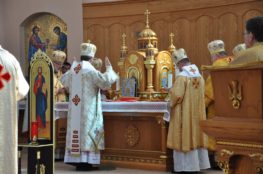The delightful and insightful Fr. John Hunwicke has posted his thoughts on Metropolitan Hilarion Alfayev’s recent paper on primary which was delivered at St. Vladimir’s Theological Seminary. There’s nothing surprising in Hilarion’s paper, which is to say that there’s nothing new in it at all. If you’ve paid even a modicum of attention to the public spat that has been going on between “Second Rome” and “Third Rome” concerning primacy then you already know where Hilarion stands. Hunwicke, not wanting to ignite a fresh round of “First Rome/Second n’ Third Rome” fisticuffs, refrains from critiquing Hilarion’s paper. Instead he draws out two points concerning local particular churches and the true meaning of synodality respectively and applies them to the present situation in the Catholic Church. Hunwicke then goes on to offer a post scriptum on the Metropolitan of Volokolamsk and his recent behavior at the “Extraordinary Synod on the Family”:
Metropolitan Hilarion was criticised by some Catholics for what he said at the Synod. I think such criticism is understandable but insensitive. Given the ecclesiastical situation in the Ukraine, where several jurisdictions are in competition for Byzantine Rite faithful and the primacy of Moskow is one of the points of fierce division, and where, moreover, there are Russian apprehensions about Western dreams of expanding Nato and the EU up to the boundaries of the Russian Federation, his words were unsurprising. Orthodox delegations have, in the past, refused to visit Rome on the Feast of Ss Peter and Paul if ‘Uniate’ archbishops were to be given the Pallium; and, at the Inauguration of the Pontificate of Benedict XVI, some of the Orthodox present turned their backs when the Greek Deacon sang the Gospel. Life will be simpler if we can try to understand their feelings; just as life will also be simpler if Russian Orthodox can try to understand the immense sympathy and admiration which we feel for a Ukrainian Greek Catholic Church which suffered a long living martyrdom for its Unity with the See of Peter.
While I applaud Fr. Hunwicke’s desire to exercise charity with respect to the Moscow Patriarchate (MP) of the Russian Orthodox Church, I fear he may not appreciate the gravity of Hilarion’s frequent remarks concerning the Ukrainian Greek Catholic Church (UGCC) — remarks which appear to be bound up with the Russian state’s war-mongering propaganda. That Russia is displeased with recent events in Ukraine is understandable; that a body which claims to be a part — a significant part — of the Church of Christ should actively and knowingly calumniate the UGCC at every turn because it, along with the two free Orthodox jurisdictions in Ukraine, is supporting Ukrainian freedom from Moscow’s political (and ecclesiastical) control is reprehensible. Hilarion has not been merely expressing his church’s centuries-old grievance concerning the “Unia”; he is beating a warm drum. And so when (too few) Catholics take a stand for the UGCC and cry foul on the MP’s external errand boy, they are well within their rights to do so.
As much as we might hope that the MP comes “to understand the immense sympathy and admiration which we feel for a Ukrainian Greek Catholic Church which suffered a long living martyrdom for its Unity with the See of Peter,” I do not expect it in my lifetime. The MP, fueled by its “Russian World” ideology, can only see the UGCC as traitorous and the Church of Rome as complicit in the Ukrainians’ “betrayal” of the allegiance they ostensibly owe to the “Third Rome.” More than that, the MP wants firm control on the reins of power within world Orthodoxy; it will never tolerate healthy, vibrant churches operating outside of its sphere of intervention. For these and many other reasons we, as Catholics, cannot trust the MP at this stage in history. It has yet to purify itself of the disastrous new form of caesaropapism which took hold after the Soviet Revolution and continues today under the watchful eye of Vladimir Putin.
In closing, let me note that the MP is not the sole fount from which the life and legacy of Russian Christianity springs, and that the upper hierarchy of the MP does not properly represent the numerous bishops, priests, and lay faithful who continue to live out their Christian faith in a manner which would put many Catholics — particularly Roman Catholics — to shame.



